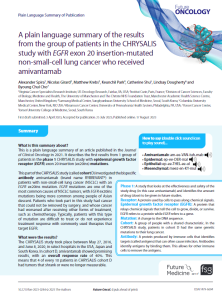Plain Language Summary: looking at patients with EGFR exon 20 insertion-mutated non-small-cell lung cancer who received amivantamab in the CHRYSALIS study
 This Plain Language Summary of Publication article from Future Oncology investigated the medication amivantamab in patients with non-small-cell lung cancer (NSCLC) with an EGFR ex20ins mutation. Typically, patients with this type of mutation are difficult to treat or do not experience treatment response with commonly used therapies that target EGFR.
This Plain Language Summary of Publication article from Future Oncology investigated the medication amivantamab in patients with non-small-cell lung cancer (NSCLC) with an EGFR ex20ins mutation. Typically, patients with this type of mutation are difficult to treat or do not experience treatment response with commonly used therapies that target EGFR.
Read the full article here.
The original article on which this summary is based is called ‘Amivantamab in EGFR Exon 20 Insertion-Mutated Non-Small-Cell Lung Cancer Progressing on Platinum Chemotherapy: Initial Results From the CHRYSALIS Phase I Study’ and was published in the Journal of Clinical Oncology.
Read the original article here.
